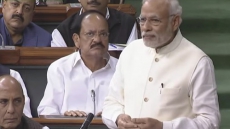Senior Congress leader Shashi Tharoor has backed his party leaders Jairam Ramesh and Abhishek Manu Singhvi's arguement that "demonising Prime Minister Narendra Modi is wrong".
"I have argued for six years now that Narendra Modi should be praised whenever he says or does the right thing, which would add credibility to our criticisms whenever he errs. I welcome others in opposition coming around to a view for which I was excoriated at the time," Tharoor said in a tweet.
Speaking at a book launch on Thursday, Ramesh said it was "time we recognise Prime Minister Modi's work and what he did between 2014 and 2019 due to which he was voted back to power by over 30 per cent of the electorate."
Ramesh said that Modi spoke a language that connected him with the people. "Unless we recognise that he is doing things which people recognise and which have not been done in the past, we are not going to be able to confront this guy. Also, if you are going to demonise him all the time, you are not going to be able to confront him," he said.
The former minister added that he was not asking anyone to applaud the Prime Minister but just wanted the political class to "recognise the traits he has brought to governance".
Singhvi supported Ramesh's remark on Twitter. "Always said demonising Modi is wrong. Not only is he the Prime Minister of the nation, a one way opposition actually helps him. Acts are always good, bad and indifferent -- they must be judged issue wise and not person wise. Certainly, Ujjawala scheme is only one amongst other good deeds. #Jairamramesh," Singhvi wrote.
The Congress leaders' remarks on Modi come after the party witnessed a difference of opinions recently, when many leaders went against the partyline to support the Central government's decision to abrogate Article 370 and bifurcate Jammu and Kashmir into two Union Territories.

